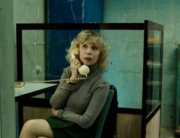Moshe Rosenthal’s debut feature is a conventional but amusing story about a couple of retired empty nesters, Meir (the always subtle Sasson Gabay of The Band’s Visit) and Tova (Rita Shukrun), who live a staid but comfortable life in a high-rise Tel Aviv apartment. They see their two grown daughters regularly, but otherwise they have fallen into a rut of familiarity and dullness, until they meet their new upstairs neighbor, Itzik (the charming Lior Ashkenazi), a gregarious, single Miami-based talent agent in his 50s.
Itzik’s overpoweringly confident presence—and his loud, late-night karaoke parties—resurrects an aliveness in Meir and Tova, transforming them, however fleetingly, into someone neither quite recognizes. The quiet, sullen Meir admits to Itzik that he wanted to be an actor, something Itzik responds to with his usual optimism, making sure a friend of his gives Meir a screen test, which actually leads to a possible career in TV commercials.
Meanwhile, Tova—who has a fashion boutique in the local mall—has been frustrated that she and her husband rarely do anything outside of visiting the local haunt. They discuss vacationing on a remote Greek island Itzik recommends, but nothing ever comes of it. As they become more interested in Itzik’s companionship, she not only pulls out her fancy shoes and dresses to wear but even goes so far as dying Meir’s hair to make him look younger. (“We need to do your eyebrows,” she tells her husband, who firmly demurs—for now.)
It’s after Tova decides she wants to set Itzik up with a friend, Bella (Keren Tzur), and invites them to dinner that cracks in the new friendship start to appear. Bella shows up, as do Tova and Meir’s grown daughters, but Itzik blows them off. The couple become vaguely aware that Itzik is not interested in women when he doesn’t arrive at all, but Tova hardheadedly goes ahead with the dinner anyway, and her daughters laugh uncontrollably at the ridiculousness of the entire evening: their mother’s belief that Itzik is a good candidate for a husband and their father’s newly colored eyebrows.
However, the friendship starts to fray. It is during its unraveling that Rosenthal starts reaching for clichés as his three protagonists confess the disappointments in their lives. It all becomes predictable and obvious, especially when the couple has a long-gestating falling-out and they are forced to reevaluate their loving but stagnating relationship. Rosenthal—who earlier showed a light touch and an ability to observe his characters’ behavior shrewdly but not without some bemusement—opts for a facile happy ending that feels less organic than audience-pleasing, shortchanging the relationships he so carefully has built up during the preceding 100 minutes.

















Leave A Comment